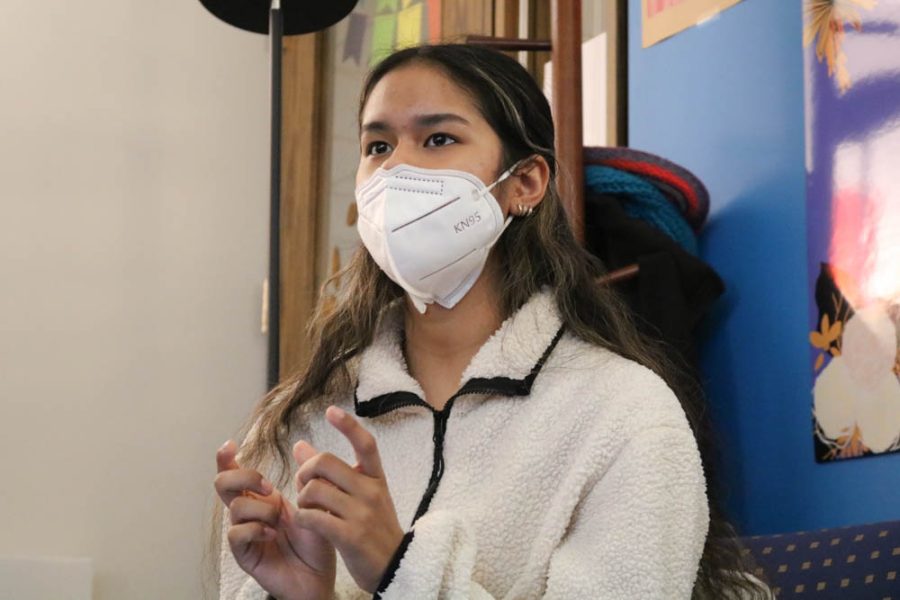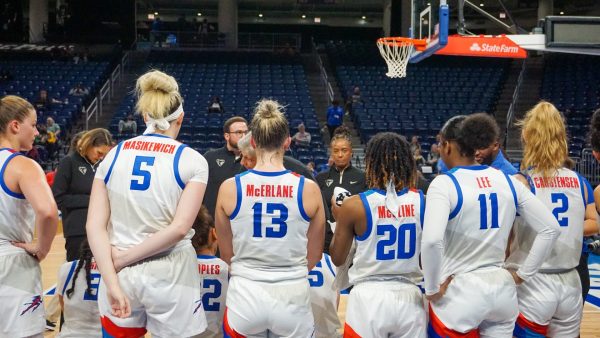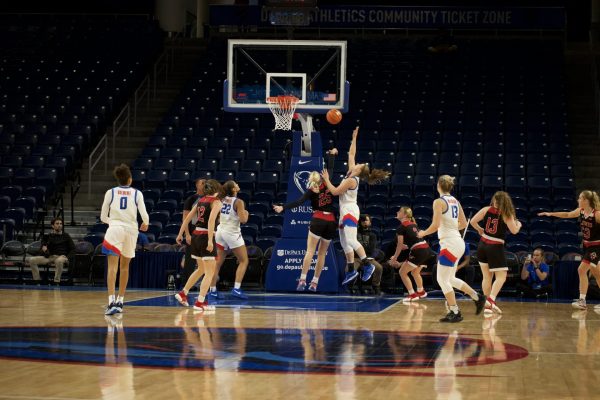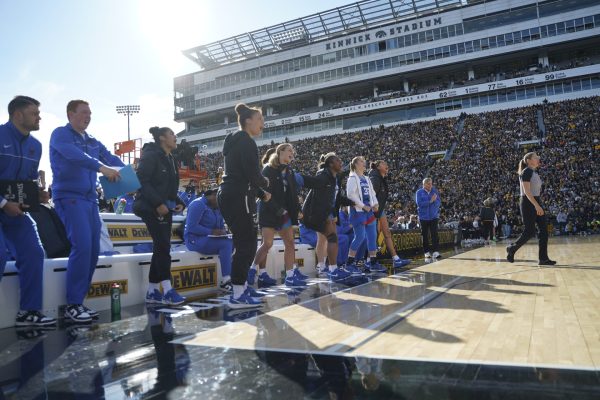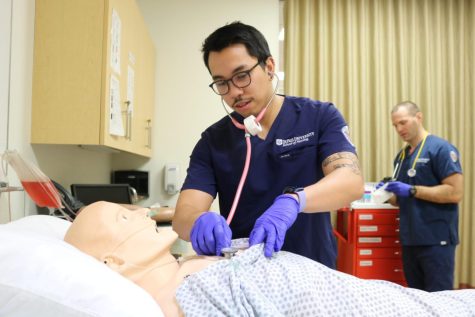DePaul student parents, caregivers want more resources as university lacks
Ilsa Archiniega, DePaul student and parent, said Mocha will be presenting at the next faculty council meeting to discuss putting student parent needs on students’ syllabi.
Graduate student Logan Owens had to outsource child care in order to balance school and parent life. Sometimes they would get creative.
“My friend sat in my car in fall quarter this year for 20 minutes until my husband could come pick up our children from her,” Owens said. “There was one time when I was in the community college where I had to go in for a special seminar and I paid another student $10 to watch my kids in the hallway.”
Student parents and caregivers are fighting for more visibility and resources at DePaul, including priority registration, syllabus statements and more community sustainability.
Two parents, Owens and senior Ilse Archiniega, join together in a group called Mocha every Wednesday in the Women’s Center, which started in 2019 as a result of a Women and Gender Studies class taught by assistant professor Heather Montes-Ireland about Mothering and Reproductive Justice. Mocha looks to connect, offer support and dismantle barriers for student parents at DePaul, and is run as a program through the Women’s Center at DePaul.
Mocha does not have a full student organization statue due to low membership. Having full status would allow them more funding and resources. Previous DePaulia reporting has showcased DePaul’s lack of educational resources for student parents as well.
Archiniega was taking courses while pregnant during her second year at DePaul. She was left unaware about any resources available to her both before and after she had her daughter.
“I wasn’t aware of what resources were established,” she said. “I quickly realized that there wasn’t a lot of flexibility with my schedule.”
On average, 1 in 5 college students raise children while in school, according to NPR. DePaul does not track the number of student parents or caregivers enrolled, but students have the option to disclose that information, according to Associate Provost for Student Success Caryn Chaden.
“It is up to a student parent or caregiver to share information about their own situation with the Office of Gender Equity or others at DePaul,” Chaden said in an email to The DePaulia.
Even if a student does disclose their parental status, the university will not check in individually to offer resources.
“How are you supposed to provide the highest aid for this group if you don’t know how many of us are currently active at DePaul?” Archiniega said.
On-campus child care
Unlike other Chicago universities, such as Northwestern, University of Illinois at Chicago and Loyola, DePaul does not have on-campus child care centers, affiliated child care or child care subsidies for staff and students. The Ray Meyer Fitness Center has children’s programs, but not explicit child care. Parents must be members and require a $25 child activation fee and program costs range from $125 to $250 per class or session, according to The Ray.
On average, Illinois families in 2020 paid $1,150 in child care for infants and $864 for 4-year-olds monthly, according to Procare Solutions.
Illinois does not consider students pursuing higher education full time as a job or work after they receive an associate’s degree. Parents are also not eligible for child care subsidies in Illinois if they both make minimum wage in Cook County. A single parent making minimum wage and receiving child support would receive $3000 in subsidies and a $168 co-pay if not receiving child support.
This has created a large gap between what student parents can afford versus what they’re actually earning.
“We paid like the cheapest daycare possible because they negotiated the rates for us,” Owens said. “It was $500 a week. It was over twice what our rent was for a one bedroom apartment.”
The lack of child care creates stress for students to balance class and find help.
“The cost of child care and good quality child care, arranging for that can be really difficult,” Montes Ireland said. “Would we prefer a student not come to class if we’re not willing to provide child care?”
Scheduling Stress
The lack of child care support has caused additional strain for student parents due to scheduling issues. Owens wanted to pursue a double major, but couldn’t because required classes had few available meeting times during virtual learning.
“There was like one required class that they were only offering at like 11:20 a.m. twice a week,” they said. “My kids want to nap at 12 p.m. every single day. My daughter was still in diapers when the pandemic started. It was not doable.”
Archiniega would schedule her entire day around specific classes. She said that a few class options required her to stay on campus all day.
“There was only one class option offered for one course that I needed,” she said. “Last quarter I was at school from 9 a.m. to 9 p.m. and it was so terrible.”
First-year Parveen Mundi’s younger brother was born during her sophomore year of high school. As a result, she quit her extracurriculars in order to take on the role as a caregiver. She currently wants to change majors, but the lack of class options makes scheduling difficult because she returns to Schaumburg three days a week to care for her brother.
“Even in terms of scheduling classes, it’s really annoying trying to build your schedule around what days can I be on campus and come to these classes or go between Lincoln Park and the Loop and what days am I just not available,” she said.
Student athletes and some disabled students are able to receive priority registration for classes, but that has not been extended to student parents and caregivers. There is also no universitywide policy requiring professors to have statements in their syllabi for student parents and attendance accommodations.
“Reasonable accommodations are determined on a case-by-case basis by the faculty or staff member working with the student, in conjunction with documentation from the Office of Gender Equity,” Chaden said.
Not every professor will issue accommodations for student parents about attendance and late work, leaving little to no flexibility in some cases
“The very day my thesis is due, my daughter has to go to the emergency room,” Owens said. “I took the day off work to put my daughter in the hospital instead of finishing my citation.”
Archiniega did receive some medical accommodations when she was taking courses while pregnant; however, not every professor was willing to work with her.
“I had a really tough pregnancy with my daughter and I was in and out of the hospital,” she said. “I remember seeing an email and [the professor] stated in very little words that ‘My class is very vigorous’, and [he’s] not sure I should be able to handle the challenges of it. I remember feeling very upset. A lot of professors are very dismissive and they’re like, ‘Why are you even here?’”
As a result, Archiniega was determined to participate as much as she could to bust the myth that student parents couldn’t succeed.
“I’m going to stay in this class, I’m going to participate,” she said.
Mundi said that she was concerned about missing class and assignments due to being a caregiver as well. Depending on the class, attendance can make up a significant part of grades.
“I think almost all my classes weigh class presence for grades,” Mundi said. “I’m going miss my class because I spent the entire weekend being a caregiver. “
The DePaulia reported on an effort from the Student Government Association (SGA) to provide Zoom options for all classes. This could provide more flexibility for student parents and caregivers.
“I don’t see how offering a way for students to sign into a zoom class while everyone else is in the classroom where there’s a couple people who can still talk online is a drastic change that is unacceptable,” Mundi said.
Chaden said that there are no federal protections for caregivers and they may be unable to receive accommodations.
“The Office of Gender Equity and Title IX office do not extend accommodations to caregivers because ‘caregiver’ is not a term outlined under the federal Title IX regulations and often is used in broader references beyond pregnancy,” she said.
Unsustainability
Without organization status, Mocha members worry that the organization could easily disappear. Mocha does not have enough members to be considered an official student organization on DeHUB which jeopardizes its future after current members graduate. Student organizations need a minimum of four members; Mocha has three.
“How does this become a sustainable continuation rather than something that’s going to stop whenever we don’t have whatever is motivating us to keep us here?” Owens said.
In 2015, there was a student organization called Parents of Little Ones (POLO) that disbanded in early 2016 yet is still listed as a resource around 2019, according to Owens.
The Office of Gender & Equity’s website remains out of date and still lists POLO and several DePaul scholarships for student parents. Chaden confirmed that DePaul does not offer scholarships for student parents, but there are two external funds listed on the Office of Gender & Equity website.
Owens had met with James Stewart, director of academic continuity and engagement, to potentially revive POLO but it would have relied entirely on them.
“My husband lost his job literally in between the time I emailed [Stewart] and when we had our meeting scheduled,” Owens said. “I cannot run a club. I didn’t even know if I would be able to stay in school. That’s unsustainable. This is like a huge systemic issue.”
Mocha is the only active resource offered at DePaul for caregivers. They also encourage allies to come as well.
“Half the resources [DePaul] refer you to don’t even exist anymore,” Mundi said. “I think part of the reason why DePaul doesn’t do it is maybe because they just don’t have any resources to give you.”
The current members are strained to sustain the only active resource for student parents at DePaul.
“I think about all the money I’ve lost not working, attending these meetings, where we don’t even have enough people to become an actual student organization,” Owens said. “It’s a lot of stress. I don’t want it to be that way.”
Creating change
SGA is working towards initiatives that would allow student parents and caregivers to receive priority registration. Chaden also confirmed there are “ongoing” conversations about resources for “students experiencing a variety of circumstances.”
Mocha is working to present at a future Faculty Council meeting about adding student parent and caregiver statements onto syllabi listing resources, such as other syllabi statements about disability and counseling.
“Our syllabus doesn’t have any contexts in which someone could say here are the resources we have for student parents,” Archiniega said.
Montes-Ireland has a statement on her syllabi stating, “my goal is to create a welcoming environment that is respectful of all forms of diversity, including diversity in parenting and caregiving status.”
“The struggles of balancing school, child care and another job are exhausting,” Montes-Ireland’s statement said. “I hope you will feel comfortable disclosing your student-parent or caregiver status to me so that you may feel supported as you strive for school and parenting balance.”
Mocha will continue to spread awareness and create community for student parents, caregivers and allies.
“It’s just us, there’s no allies, there’s nobody there to be in [a]community, to build community with us,” Owens said. “That’s the key component that I want to bring back.”


